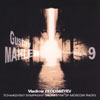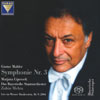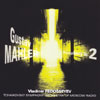Mahler Symphony No 3
Mahler approaches that range from the avuncular to hard-pressed intensity
View record and artist detailsRecord and Artist Details
Composer or Director: Gustav Mahler
Genre:
Orchestral
Label: Relief
Magazine Review Date: 6/2005
Media Format: CD or Download
Media Runtime: 72
Mastering:
Stereo
Catalogue Number: CR991072

Tracks:
| Composition | Artist Credit |
|---|---|
| Symphony No. 9 |
Gustav Mahler, Composer
Gustav Mahler, Composer Moscow Radio Tchaikovsky Symphony Orchestra Vladimir Fedoseyev, Conductor |
Composer or Director: Gustav Mahler
Genre:
Orchestral
Label: Farao Classics
Magazine Review Date: 6/2005
Media Format: Super Audio CD
Media Runtime: 100
Mastering:
Stereo
DDD
Catalogue Number: S108047

Tracks:
| Composition | Artist Credit |
|---|---|
| Symphony No. 3 |
Gustav Mahler, Composer
Bavarian State Orchestra Gustav Mahler, Composer Marjana Lipovsek, Mezzo soprano Vienna Boys' Choir Women's Chorus of the Vienna Singverein Zubin Mehta, Conductor |
Composer or Director: Gustav Mahler
Genre:
Orchestral
Label: Relief
Magazine Review Date: 6/2005
Media Format: CD or Download
Media Runtime: 80
Mastering:
Stereo
DDD
Catalogue Number: CR991069

Tracks:
| Composition | Artist Credit |
|---|---|
| Symphony No. 2, 'Resurrection' |
Gustav Mahler, Composer
Dagmar Pecková, Mezzo soprano Elena Voznessenskaya, Soprano Gustav Mahler, Composer Moscow Chamber Choir Moscow Radio Tchaikovsky Symphony Orchestra Vladimir Fedoseyev, Conductor |
Author: David Gutman
On this evidence, Zubin Mehta’s stint with the Bavarian State Opera has transformed its house orchestra. Gone is the edginess displayed even under conductors like Carlos Kleiber; in its place a cushioned smoothness and affability. How appropriate this is in Mahler I’m not sure, yet the Third, an uncommonly optimistic work, is one Mehta knows better than most; this is his third official recording. Hence the sprawling first movement hangs together well even if the avuncular approach may surprise those used to Sir Simon Rattle’s insistent exhumations of detail. Under Mehta there’s a risk that the discourse will seem to matter less for all the finish of the playing. The soloist in the fourth movement Nietzsche setting ‘O Mensch!’ is the Slovene veteran Marjana Lipovsek, Semyon Bychkov’s choice (Avie, A/03). Characterising less blandly than her Bavarian partners, with a warm vibrancy in the middle part of her voice, she is less reliable on top. Mehta follows Salonen (Sony, 7/98) and Litton (Delos, 6/00) in rejecting Rattle’s famously rigorous interpretation of Mahler’s Hinaufziehen (‘Pull up’) marking; there’s no hint of upward glissando in the bird cries on oboe and cor anglais.
The rapt opening of the finale, beautiful in its way, is not so much poignant and intense, more a warm bath at the end of a long day. The playing is first-rate even if the trumpets are not absolutely in tune on the symphony’s final page. There is no stunned silence at the close. Viennese audience members offer warm and immediate applause to a maestro they have long admired. A word on the packaging: the booklet, notably well illustrated, should make a wonderful souvenir for attendees. There are two discs with no awkward partitions to fall out of the jewel case, although the break between them is wrongly placed. Mahler’s texts are given without English translation.
While Mehta might not offer a life-changing experience, his reading is characteristically easy on the ear. Not something one could say about Vladimir Fedoseyev’s Mahler. This will be a difficult sell. Mahler concerts from Putin’s Russia do not have the historic interest of the old Kyrill Kondrashin LPs which laid the groundwork for the composer’s rehabilitation in the Soviet Union. Unlike Evgeni Svetlanov, who recorded his Mahler series too late, Fedoseyev favours generally pressed tempi, riding roughshod over detail to achieve a certain brutish intensity. Aficionados of the remarkable, firm-voiced mezzo Dagmar Pecková may wish to explore her contribution to Fedoseyev’s Resurrection, another rendition in which you can forget neurasthenic beauty of sound. The inner movements are given their space but the precipitate jauntiness of the opening funeral march must be heard to be believed – Mahler meets Ruslan and Lyudmila!
Discover the world's largest classical music catalogue with Presto Music.

Gramophone Digital Club
- Digital Edition
- Digital Archive
- Reviews Database
- Full website access
From £8.75 / month
Subscribe
Gramophone Full Club
- Print Edition
- Digital Edition
- Digital Archive
- Reviews Database
- Full website access
From £11.00 / month
Subscribe
If you are a library, university or other organisation that would be interested in an institutional subscription to Gramophone please click here for further information.




